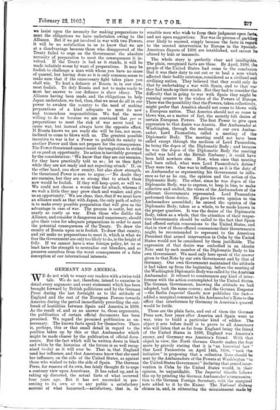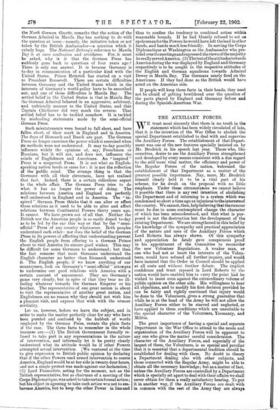GERMANY AND AMERICA.
WE do not wish to weary our readers with a twice-told tale. We do not, therefore, intend to examine in detail every argument and every statement which has been brought forward by British politicians and by the German Press during the last fortnight as to the attitude of England and the rest of the European Powers towards America during the period immediately preceding the out- break of hostilities between Spain and America in 1898. As the result of, and as an answer to, those arguments, the publication of certain official documents has been promised. We regard the promised publication as un- necessary. The known facts for themselves. There is, perhaps, this or that s detail in regard to the position taken up by this or that Ambassador which might be made clearer by the publication of official docu- ments. But the fact which will be written down in black and white by the historian of the future is as well recog- nised to-day as it will ever be. That is, that England used her influence, and that Americans know that she used her influence, on the side of the United States, as against those who wished to take the side of Spain. The German Press, for reasons of its own, has lately thought fit to urge a contrary view-upon Americans. It has raked up, and in raking up distorted, the actual facts of what occurred four years ago. But it has not succeeded in pre- senting to its own or to any public a satisfactory account of what hannened.—satisfactory. that is to sensible men who wish to form their judgment upon facts, and not upon suggestions. Nor was its process of garb ' ever likely to succeed, simply because the facts in to the mooted intervention by Europe in the Spanish- American dispute of 1898 are established, and cannot be altered by hint or innuendo.
The whole story is perfectly clear and intelligible. The plain, recognised facts are these. By April, 1898, the people of the United States had come to the conclusion that it was their duty to cut out or to heal a sore which affected their bodily existence, considered as a civilised and civilising nation. They believed that they could only do that by undertaking a war with Spain, and to that war they had made up their minds. But they had to consider the difficulty that in going to war with Spain they might be running counter to the wishes of the Powers of Europe. There was the possibility that the Powers, taken collectively, might prefer that America should not come to blows with a European nation. That America should not so come to blows was, as a matter of fact, the secretly felt desire of certain European Powers. The first Power to give open expression to that desire was Austria. Her Ambassador at Washington, through the medium of our own Ambas- sador, Lord Pauncefote, called a meeting of the Diplomatic Body. The meeting could not have been called except through the medium of Lord Pauncefote, he being the doyem of the Diplomatic Body ; and because he was the doyen of the Diplomatic Body the meeting called was held at the British Embassy ; it could have been held nowhere else. Now, when once that meeting had been called, what were Lord Pauncefote's duties ? They were two. One was to influence, as it is the duty of an Ambassador as representing his G-overnment to influ- ence as far as he can, the opinion and the action of the Diplomatic Body. The other, since he was doyea of the Diplomatic Body, was to express, to keep in line, to make collective and unified, the views of the Ambassadors of the different Governments represented. Lord Pauncefote performed those duties. He gave his own opinion to the Ambassadors assembled ; he caused the opinion of the Diplomatic Body, taken as a whole, to be made known in the proper quarters. It was the desire of the Diplomatic Body, taken as a whole, that the attention of their respec- tive Governments should be called to the fact that Spain had offered certain concessions to the United States, and that in view of those offered concessions their Governments might be recommended to represent to the American President that armed intervention in Cuba by the United States would not be considered by them justifiable. The expression of that desire was embodied in an identic Note sent by each member of the Diplomatic Body to his own Government. We need only here speak of the answer given to that Note by our own Government and by that of Germany. Our own Government maintained the attitude it had taken up from the beginning, before the meeting of the Washington Diplomatic Body was called by the Austrian Ambassador. It refused to countenance any kind of inter- ference with the action contemplated by the. United. States. The German Government, knowing the attitude we had adopted, took the same course; and the German Emperor —the Berlin Imperial Gazette now publishes the fact— added a marginal comment to his Ambassador's Note to the effect that interference by Germany in America's quarrel would be futile.
Those are the plain facts, and out of them the German Press now, four years after America and Spain went to war, tries to build a particular kind of edifice. The object it seta before itself. is to prove to all Americans who will listen that so far from England being the friend of the United States in 1898, England was America's enemy, and Germany was America's friend. With that object in view, the North German Gazette makes the first move by gravely stating that it is "an historical fact" that Lord Pauncefote on April 14th, 1898. "took the initiative" in proposing that a collective Note should be sent by the Ambassadors of the Powers at Washington "to the United States Government" declaring that armed inter- vention in Cuba by the United States would, in their opinion, be unjustifiable. The Imperial Gazette follows this up by printing the German Ambassador's communica- tion to the German Foreign Secretary, with the marginal note added to it by the Kaiser. The National Zeilung chimes in, and, in reiterating the misstatement made by and unfriendly manner to the United States, and that Captain Chichester did very much the reverse. That settled belief has to be tackled somehow. It is tackled by misleading statements made by the semi-official German Press.
Such misstatements were bound to fall short, and have fallen short, of their mark in England and in. America. The days of Bismarck and Busch are past. The German Press no longer exercises the power which it exercised when its methods were not understood. It may to-day possibly influence widely the opinions of, say, Frenchmen or Russians, but it will not, and does not, influence the minds of Englishmen and Americans. An " inspired " Press is a suspected Press. It is not what an English- speaking nation heeds or cares for : it is not the reflection of the public mind. The strange thing is that the Germans. with all their cleverness, have not realised that fact. Indeed, there is a certain ridiculous aspect to the whole affair. The German Press tries to do what it has no longer the power of doing. The relations between America and England are perfectly well understood in England and in America. The " in- spired " German Press thinks that it can alter or affect those relations as it used to be able to alter and affect relations between Continental Powers thirty years ago. It cannot. We have grown out of all that. Neither the British nor the American people is so easily duped to-day as to be led by the ear this way or that by the " semi.
understand each other : nor does the belief of the official " Press of any country whatsoever. Both =lac,: Pfess in its powers of affecting that understanding prevent the English people from offering to a German Prime p.bout to visit America its sincere good wishes.. This may be difficult for some Germans to understand ; but then the fact remains that most Germans understand the English character no better than Bismarck understood it. The English people, if we know anything of our countrymen, look on Germany's " semi-official " attempts to undermine our good relations with America with a certain amount of amusement. They see Germany's game very clearly, but in spite of that they bear no ill- feeling whatever towards the German Emperor or his brother. The representative of one great nation is about to visit the representative of another great nation, and Englishmen see no reason why they should not wish him a pleasant visit, and express that wish with the utmost cordiality.
Let us, however, before we leave the subject, and in order to make the matter perfectly clear for any who have been puzzled and confused by the hubbub of words employed by the German Press, restate the plain facts of the case. The three facts to remember in the whole business are:—(1) The British Government formally re- fused to take part in any representations in the nature of intervention, and informally let it be pretty clearly understood what its attitude would be if other Powers attempted actual intervention. [We ventured at the time to give expression to British public opinion by declaring that if the other Powers used armed intervention to coerce America, England would be at her side in twenty-four hours, and not a -single protest was made against our declaration.] (2) Lord Pauncefote, acting for the moment, not as the British representative, but as chairman of a meeting of the Corps Diplomatique, was asked to take certain formal action; bat his object in agreeing to take such action was not to em- barrass -America, but to keep -the other Power in line and the North German Gazette, remarks that the action of the thus to confine the tendency to combined action within German Admiral in Manila Bay has nothing to do with reasonable bounds. If he had bluntly refused to act as the question at issue—namely, the initiative taken or not spokesman for the Powers hewould have left thelead in other taken by the British Ambassador—a question which it hands, and hands much less friendly. In serving the Corps calmly begs. The National Zeitung's reference to Manila Diplomatique at Washington as the Ambassador who pre- Bay is at once confession and avoidance. For, it must sided overitsmeetingsandexpressed theviews of the majozity be asked, why is it that the German Press has he really serred America. (3) The test of the attitudes towards suddenly gone back to questions of four years ago p America during the war displayed by England and Germany There is only one answer. It is because Germany is respectively is to be sought in the respective attitudes of to-day in communication of a particular kind with the the English and German squadrons towards Admiral United States. Prince Heinrich has started on a, visit Dewey in Manila Bay. The Germans nearly fired on the to President Roosevelt. There are certain difficulties Americans. If they had done so the British would have between Germany and the United States which in the acted on the American side.











































 Previous page
Previous page